Powerit Solutions is on a roll lately. The automated demand management company, which focuses on heavy industry, raised an additional $5 million in funding in March and brought on a new CEO.
The double injection was geared to help the company expand its channel partners, the first of which was announced this week. Powerit has a new agreement with Inductotherm Corp., the market leader in equipment for the melting of metals and materials to take Powerit’s Spara system to the metals market.
The world of smart grid, and demand response specifically, feels a lot like a land grab there days, according to Bob Zak, General Manager and President of Powerit Solutions North America. Having strategic alliances is key if you’re going to plant your flag in some prime real estate.
There are about 3,000 metals melting foundries in the U.S., ranging from about 3 MW on the small end to about 40 MW for steel plants, according to Zak. The managers already have working relationships with companies like Inductotherm, and so Powerit is leveraging that domain experience to work with their customers.
“We want to have a relationship with one of the most important players in the business,” said Zak. “It drives deeper and wider customer relationships.”
Powerit is approaching the market by looking at verticals. It already has a foothold in the food and beverage manufacturing business and some presence in the metals market. Whereas other companies have found that heavy manufacturing does not lend itself well to demand response, Powerit has found that its automated, tailored solution to each industry can help those companies make the most out of demand response programs -- including spinning reserves and, eventually, regulation services.
At one superalloy plant in Muskegon, Mich., Powerit helped cut the Cannon-Muskegon Corporation’s peak demand by 26 percent at that location. Zak said that companies like Inductotherm find that having Powerit’s software as part of their offerings is a huge value-add in markets where energy bills are a risk factor to the business.
“You need a system that’s flexible so they can integrate it well with their process,” said Zak. “And if you can put those two together and scale it, now you have smart grid movement instead of a smart grid hobby.”
As far as future partnerships, of which Powerit expects to announce many this year, they might not all come from equipment makers. The Seattle-based company is also looking into commercial buildings -- and could team up with a building controls player in the future. The company, which was founded in Sweden and then essentially exported to the U.S., is returning to its roots, looking at opportunities in Europe, where Zak said demand response is even less mature than in the U.S.



